Salesforce is one of the most popular ecommerce solutions that has recently gone beyond the customer relationship management (CRM) it’s associated with the most. Now it’s become a favorite platform of large ecommerce brands with strong sales teams leveraging out-of-the-box features of Salesforce Commerce Cloud (SFCC).
Still, you may notice that besides being one of the most powerful solutions in the market, Salesforce is also quite expensive. Charging per user, Salesforce Commerce Cloud pricing may go as high as $600K. So the stakes are quite high.
Elogic has been operating for 14+ years in the market and is a certified Salesforce implementation and consulting partner. And we can surely tell you that SFCC has various tier-based plans with features for all needs and budgets, including small, medium, and enterprise-level companies.
In this article, you’ll learn more about Salesforce pricing plans, features adding to the steep Salesforce Commerce Cloud pricing, and retailers that will take the most out of the solution.
Why Is Salesforce Pricing So Expensive?
The Salesforce pricing model focuses on high-growth clients with a steady income and developed client base and offers services that will help such businesses grow even further. While small businesses (SMBs) may find a majority of the Salesforce ecommerce tools too expensive, they might not need all of them at this point (like automated emailing if you have only 50 clients).
However, the company offers plenty of integrations that SMBs can afford. The most important thing here is to understand what Salesforce has and measure it against your business goals and priorities.
There are a few factors that influence the cost of Salesforce within the chosen plan.
- Core features and add-ons. Salesforce prices depend on the features the ecommerce platform will have within the chosen plan. Since the solution targets businesses of various sizes, you’ll find different plans with the functionality that each company might need. Usually, the more feature-packed the plan is, the higher the pricing will be. Plus, keep in mind that Salesforce add-ons will require additional fees.
- Business needs. While SMBs may find every necessary functionality within the general Salesforce plans, enterprise-level companies will need more customized solutions. That’s why Salesforce also has Salesforce+, an enterprise-oriented platform for high-growth clients and B2B. Salesforce+ has a custom pricing model based on the business revenue, needs, and business model, and you’ll know the price after you talk to the Salesforce team.
- Number of users. Salesforce price plans are mentioned per user. For example, if you have four people managing the ecommerce side of your business and you choose the Essentials plan, you’ll need to multiply the price by four to get the accurate price estimate.
- Billing type. The Salesforce software pricing plan allows annual or monthly billing, with monthly fees being usually more expensive. If you have used any Salesforce product, that monthly payment option will be an advantage as you can try the platforms and tools before investing in it. Plus, with monthly billing, switching to other ecommerce tools will be easier. Pay attention that only some solutions have either monthly or annual billing. For example, Salesforce Commerce Cloud is billed annually, whereas you can pay for Salesforce Service Cloud either annually or monthly.
Unlike its other enterprise platforms, such as Adobe Commerce (Magento) and Shopify Plus, Salesforce doesn’t charge the license costs upfront, which saves your business from losses in case the sales decline.
However, functionality is the thing that influences the cost of the Salesforce plan the most. Let’s review a few solutions that are worth every buck.
Salesforce Commerce Cloud
Salesforce Commerce Cloud is a unifying service that allows businesses to provide ecommerce activity and manage customer interactions across channels and devices. The beauty of this solution is that every team (Sales, Marketing, Support) gets access to the customers’ data, helping them create a seamless all-around customer experience.
Read more: Salesforce Commerce Cloud Overview: Features & Benefits
The Salesforce Commerce Cloud has three core features: Salesforce B2C Commerce, Salesforce B2B Commerce, and Order management. Let’s review how much each will cost you and what it can do.
Salesforce B2C Commerce Pricing
Salesforce Commerce Cloud will be optimal for enterprise-level businesses that want to set up an ecommerce platform once and for all, have all the tools in one place, and allow the teams to collaborate. While all users enjoy the same features, the average price of the Salesforce Commerce Cloud depends on the following factors:
- Number of sites: the channels through which the business can sell
- Number of price books: a tool that allows setting different prices based on promotions, region, and so on
- Number of on-demand Sandbox credits: a tool that allows you to create a copy of your ecommerce organization for various purposes (test development integrations, marketing strategies, training, and so on)
This difference is the reason for the three-tier Salesforce Cloud Commerce pricing plans:
- Starter: best for the single shop owner who has one website
- Growth: SMBs with up to five websites/shops
- Plus: enterprise-level companies with unlimited websites/shops
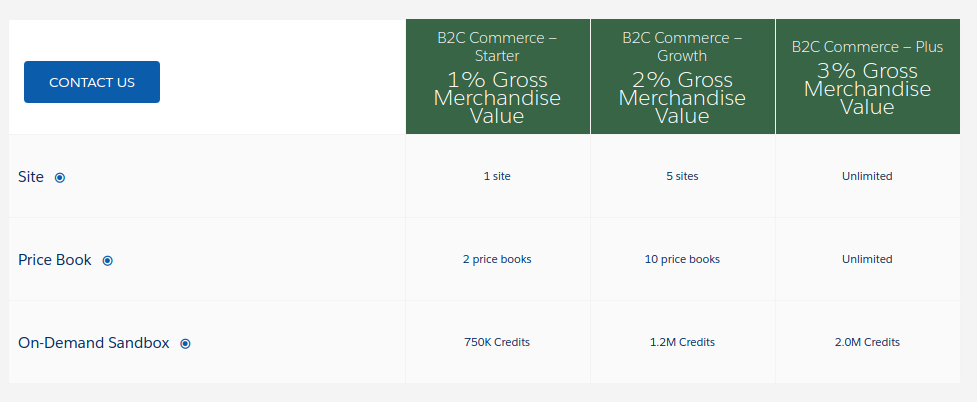
What does the Salesforce Commerce Cloud pricing cover?
- Mobile commerce: Salesforce includes mobile-first capabilities in design and performance, providing your customers with seamless shopping across all devices and platforms
- Full-feature reference application that includes Cart and Checkout: you can use it as an out-of-the-box solution or hire Salesforce ecommerce developers to integrate add-ons
- Native targeting and A/B testing: check and deploy solutions that suit specific audiences/locations better and test the functionality before implementing site-wide changes
- Product, pricing, and catalog management: get a centralized view of your products and prices across various channels, currencies, and languages
- Ad campaigns and content management system (CMS): create, launch, and test campaigns and promotions for different audiences, markets, and channels based on customers’ preferences and buying behavior
- Search site and guide navigation: make it easier for your customers to search for the specific product to increase conversion
- SEO: search engine optimization tools help enhance page rank, drive more traffic, and grow faster
- Borderless scalability: secure infrastructure will simplify the process of entering new markets and enable smooth scaling to meet the growing demand
- Multisite management and localization: Salesforce offers a unified framework to manage currencies, geographies, and languages
- Internationalization: with Salesforce Commerce Cloud, you can easily manage transactions based on local requirements, and currencies, and comply with tax regulations
- AI integration: deliver personalized customer experiences and smoothen business workflows
If you are a B2B company or plan to sell businesses, Salesforce Commerce has a solution that will be a better fit.
Salesforce B2B Commerce Cloud
Salesforce B2B Cloud offers an ecommerce platform tailored to the specific needs of B2B businesses, such as order management, store monitoring, paperwork, and so on. This solution requires an annual contract, which is why you must understand all the features it has to choose the optimal plan.
This solution has three tiers: Starter, Growth, and B2B2C Commerce.
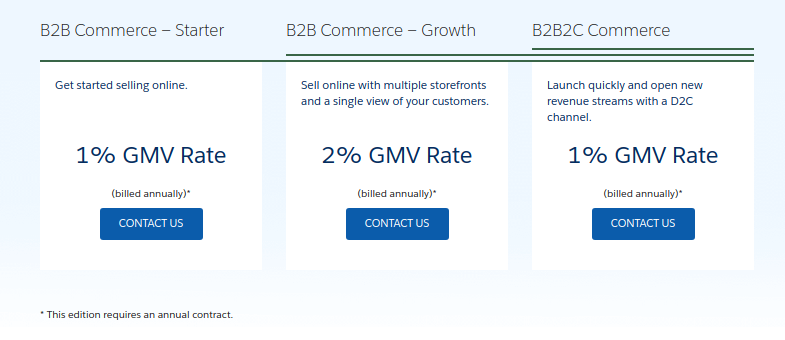
- Starter: ideal for those companies that just started selling B2B online
- Growth: great for companies that have a few online stores and want to have centralized control over them
- B2B2C Commerce: suitable for the companies that sell both B2C and B2B and that need a unified view of their activities and revenue each brings
To boost your B2B commerce, Salesforce B2B solutions enable you to customize the experiences depending on the industry and its requirements, share data across B2C and B2B channels to improve revenue, and enhance order visibility. In addition, the solutions help your clients buy in one click, search for products more easily, and receive customized recommendations thanks to AI.
Read more: The Best B2B Ecommerce Platform: How to Choose the Right Solution for Manufacturers And Wholesalers
Paired with Order Management, these features will help you set up your ecommerce business, expand it overseas, and manage the processes from a centralized platform.
Salesforce Order Management
Businesses benefit from omnichannel and flexible order management, and this tool helps do it internationally. Salesforce Order Management offers three options:
- Order Visibility (can be integrated with other ecommerce platforms)
- Order Management for Starter
- Order Management for Growth
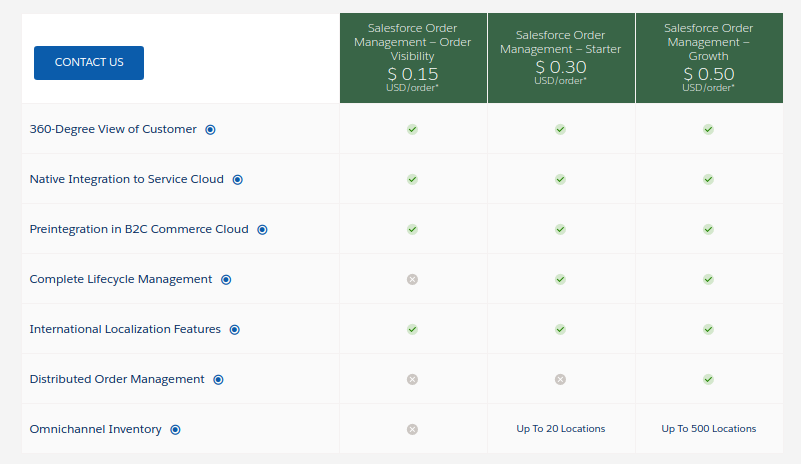
Order Visibility includes all the basic features the business needs to address order management, such as self-service portal, native language support, global currency, and local formatting
Salesforce’s Starters and Growth plans have more extensive feature lists, including
- 360-degree customer view: Native Integration to Service Cloud, Preintegration into B2C Commerce Cloud, Self-service
- Complete lifecycle management: Payment, Invoicing, Refunds, Returns, and Cancellation
- Lightning Flow for prebuilt order workflows: API solutions and click-or-code custom integrations
- Extended AppExchange capabilities: tools for BOPIS models; Tax and Returns handling; unified shipping thanks to Narvar, Zenkraft, and ShipStation
- Out-of-the-box localization: Native language support, Global currency, Local formatting
The Growth plan has an additional feature, Distributed order management, available only in this plan. It includes location-based stores and stock navigation and a single source of truth for digital and physical locations, which will be helpful if you have multiple stores and warehouses in different locations. This feature is essential for B2B clients specifically as they need to navigate the logistics and supply chain fast to avoid delays and fees associated with it.
Salesforce Sales Cloud
Salesforce Sales Cloud helps merchants improve sales by providing them with a unified view of customers’ data across teams, which allows for more precise campaign creation and targeting. But that’s not the whole story.
The platform’s powerful analytics tools help you track market changes and point out the areas where you should put more effort. Plus, it tracks your top leads so you can do better email marketing. Also, your sales representatives can manage the deal in one place and view all customer’s interactions with the company, which helps provide customized experiences across the sales channels.
The product has four tiers: Essentials, Professional, Enterprise, and Unlimited. The price of Salesforce Sales Cloud also depends on the features available in each plan:
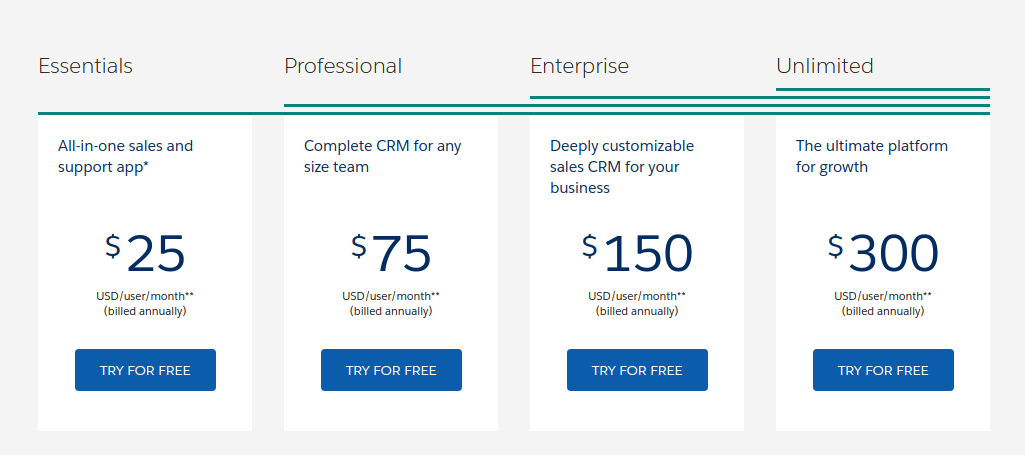
- Essentials. This solution is ideal for small companies that want to power their ecommerce with better insights about their customers. The Essentials plan includes tools for lead, account, and opportunity management mobile app with full offline functionality, and other basic features.
- Professional. This plan offers a complete CRM for any size team and will be the best fit for those who need more visibility into the business’s health and set custom KPIs.
- Enterprise. For those businesses that need more integration, Salesforce offers an Enterprise plan that can be customized with the help of ecommerce developers.
- Unlimited. This plan combines all the features from the above plans and allows for deep transformation and more add-on options.
You can try any Salesforce Sales Cloud plan for free to see which works best for your business. Plus, the company currently offers a 30% discount for this product.
Salesforce Service Cloud
Salesforce Service Cloud is a set of tools that help businesses engage customers at every stage and manage customer relationships. This customer relationship management (CRM) system has four tiers: Essentials, Professional, Enterprise, and Unlimited. Let’s see what’s included in the Salesforce Service Cloud pricing.

- Essentials. This plan will fit small businesses as it provides an all-in-one sales and support app needed to get things started, like Case Management, Knowledge base, telephony integration, and Service Console app for enhanced monitoring.
- Professional. This is a complete service CRM for teams of any size, most optimal for SMBs. Alongside the features of Essentials, this plan also allows for managing warranties, subscriptions, or maintenance agreements. UIt helps service-oriented businesses to streamline the paperwork. API integrations can be purchased separately for $25/user/month.
- Enterprise. This customizable CRM for high-quality service management offers all the features from the Professional plan plus allows for API integrations (REST, SOAP) that help connect this service with other tools within your ecommerce infrastructure.
- Unlimited. If you need more custom and integration options, Salesforce has an Unlimited plan for a full-featured CRM system. It includes all Enterprise services plus a support team with Live Agent online chat and success guides that help improve the quality of customer service and upsell/cross-sell.
You can try each of these plans for free and choose the most suitable solution.
Salesforce Marketing Cloud
Salesforce Marketing Cloud is a one-stop shop for unifying all marketing activities, dashboards, and analytics. It helps marketing teams respond to customers’ actions, set up and control messaging flow across all channels, and discover insights for tailoring marketing campaigns. The solution offers a variety of features and plans, which means the total Salesforce Marketing Cloud price will be based on the tier you choose and the additional services you’d like to integrate.
Here’s the list of core functionality that makes Salesforce Marketing Cloud worth every buck.
Customer data platform. It provides a single source of trust for the teams, so they can operate with the same information, creating a seamless customer experience.
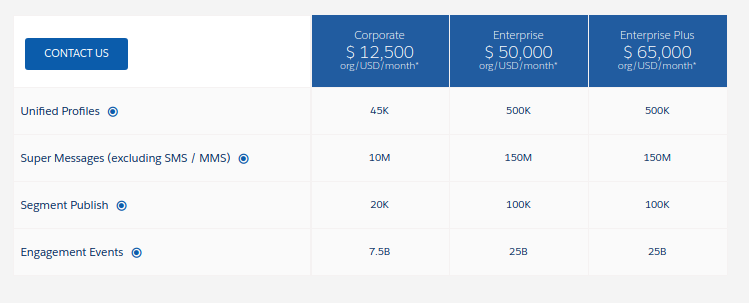
Loyalty management. This tool is used to create customized experiences, offer tailored promotions, and define loyalty programs based on customer activity and predictive analytics. Besides, it streamlines the workflows associated with loyalty program partners.
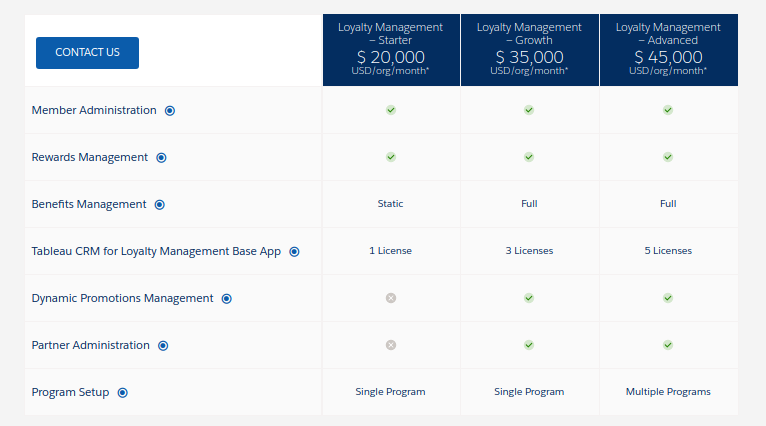
Account engagement. The solution allows you to automate marketing and analytics and find qualified leads with Einstein AI (Advanced and Premium packages) to grow your business.
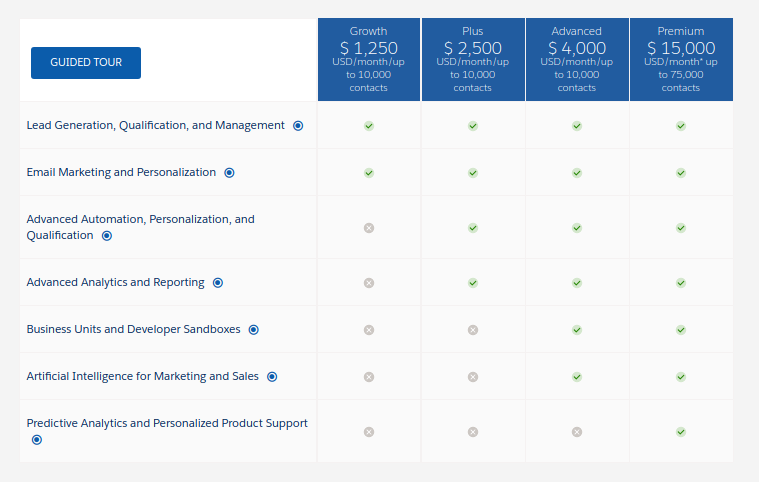
Engagement. The Salesforce Engagement feature provides any business with the best-fit solution to improve customer engagement. Automated email marketing and content creation will help you build customer journeys for each audience, and the Enterprise plan will allow you to manage multiple businesses from a single platform.
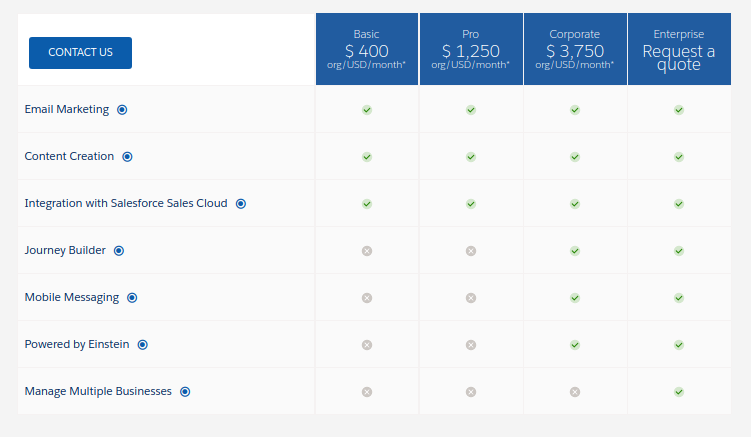
Intelligence. Get valuable insights into your marketing activity every step of the way. With Salesforce Data Integration Engine and AI insights, your employees will access the information on the marketplace and visualize it in easy-to-use forms. This will give your business an advantage to make decisions fast and flexibly.
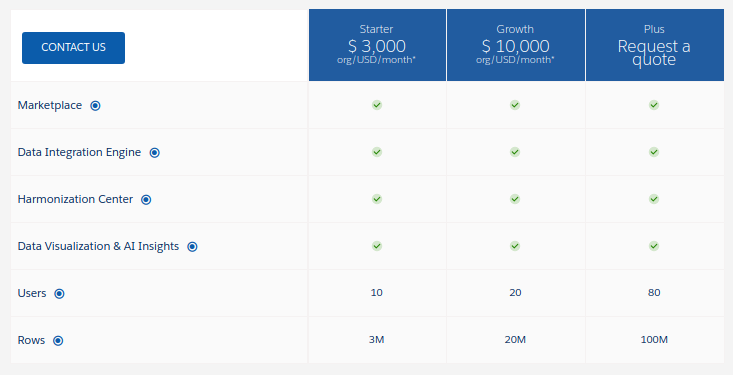
Personalization. This tool allows personalized experiences for each customer that uses your ecommerce website across all devices. Your team can set rule-based decisions for each customer segment and test the choices. The premium package includes AI and ML integrations for real-time data-driven product recommendations and next-best-action offerings.

Advertising. With the Advertising feature, your team gets access to real-time lead captures to speed up conversion. It integrates the data from your CRM system to improve customer journey building and automatically updates your audiences, so you have more control and visibility of your TA. Expect to pay $2000/month for a Professional plan of Salesforce Advertising Studio.
Content Management System. Included in the Experience Cloud package, this tool provides your marketing team with comprehensive solutions to manage content. Salesforce’s CMS has configurable templates, content record tracking, cross-channel content management, and smooth integration with other Salesforce tools and third-party platforms. The price is included in all Experience Cloud purchases.
Salesforce Anywhere
Salesforce Anywhere is an app for your team that helps them stay connected, receive real-time updates on the go, and enhance team progress.
Read more: What is M-commerce: Types, Features and Trends
This feature costs $100 per user per month and offers the following:
- Remote document sharing
- Real-time alerts
- In-context chats
- Mobile optimization
- Team progress updates
- AI-suggested actions, and more.
This solution is great for remote teams and managers who travel often and need to always keep up with the latest news.
Salesforce Pardot
Salesforce Pardot is a useful feature that allows B2B companies to automate their marketing workflows at scale, drive more revenue, and identify hot leads faster. This option is available in four plans: Growth, Plus, Advanced, and Premium.

- Growth: all the essential CRM features for lead scoring, grading, and nurturing, email marketing, and engagement reporting
- Plus: all features from Growth +B2B marketing analytics, integration with Google Ads, and dynamic content dashboards
- Advanced: all features from Plus + AI-powered tools (Einstein Attribution, Predictive Lead and Behavior Scoring, and Campaign Insights), API integration
- Premium: all features from Advanced +Developer Sandboxes, access to B2B Marketing Plus and Premier options
Each of these plans can be powered with additional products for effective selling, data visibility, and analytics:

Have a look at the detailed feature list and plan comparison, and see which option will work for you the most.
Now that you know the major Salesforce cloud services, let’s see what you should consider before choosing one.
How to Choose the Right Solution and Pricing Plan For Your Business?
When you choose among Salesforce ecommerce pricing plans, you need to consider your business needs and budget. Answering the following questions will help you understand what features to opt for.
- How many sites do you have (physical and digital)?
- What’s your ecommerce platform budget?
- How many users will be?
- Do you sell overseas?
- What does your current ecommerce architecture look like (if any)?
- How much traffic do you usually have?
- What are your business goals for the next five years?
- Do you have a tech partner to set up the platform and integrate the needed add-ons?
The Salesforce Cloud solutions help businesses set up the store, test different versions in specific countries or on tailored audiences, and choose Salesforce add-ons to create a platform that suits your business needs. Besides, businesses that already use Salesforce solutions will find it cheaper and more convenient to integrate other Salesforce products from their ecosystem.
This process will certainly require a tech-savvy team to help you choose and integrate the tools that will be worthy of investment.
Read more: Why & How to Hire Salesforce Commerce Cloud Consultants
At Elogic, you can hire skilled Salesforce developers to help you seamlessly switch to a more feature-packed ecommerce platform. We have specialists in IoT integration, AI and ML solutions, cloud computing, and frontend and backend development to write custom codes and make sure your ecommerce platform has everything needed to satisfy customers’ demands and enhance your business workflows.
Have a look at what our clients say about the quality of our services!
Final Thoughts
Salesforce offers plenty of solutions for various-sized businesses to manage their customers, workflows, and data more efficiently. Salesforce Commerce, Marketing, Sales, and other Clouds will be useful for B2B and B2C ecommerce merchants that plan further digitalization and market growth. And at Elogic, we are here to make this migration successful for you.
If you want to choose the best solution without overpaying for unnecessary services, our team will help you make an informed decision. Contact Elogic today and let’s discuss what Salesforce features will help your business grow!
Partner with a certified Salesforce development agency and get expert consulting on platform implementation services
Learn moreFrequently Asked Questions
What is included in Salesforce Commerce Cloud?
The Salesforce Commerce Cloud includes mobile commerce, a full-feature reference application that includes Cart and Checkout, native targeting and A/B testing, product, pricing, and catalog management, ad campaigns and content management, search site and guide navigation, SEO, borderless scalability, multi-site management and localization, internationalization, and AI integration features.
What is the difference between Salesforce Sales Cloud and Commerce Cloud?
Salesforce Commerce Cloud is a platform for creating ecommerce stores, managing the store, and selling products/services. Salesforce Sales Cloud is a tool that collects and processes the customers’ data to power your sales reps with market insights, so they create data-driven campaigns, offer customized solutions, and market products to the best-fit TA.
How much does Salesforce cost for small businesses?
The price of Salesforce Commerce Cloud is 1% of gross merchandise value plus the cost for various add-ons. This starter solution will help you launch and grow the ecommerce business faster.
Is the Salesforce Commerce Cloud better than Magento Cloud?
It depends on your business needs and whether the platform has the tools you need to improve your business processes. While Salesforce is one of the biggest ecommerce solutions providers, it’s not the only one. We recommend you compare other platforms’ offerings like BigCommerce to make an informed decision. We at Elogic are platform-agnostic, which means we can help you set up any of them.
Frequently Asked Questions
What is included in Salesforce Commerce Cloud?
The Salesforce Commerce Cloud includes mobile commerce, a full-feature reference application that includes Cart and Checkout, native targeting and A/B testing, product, pricing, and catalog management, ad campaigns and content management, search site and guide navigation, SEO, borderless scalability, multi-site management and localization, internationalization, and AI integration features.
What is the difference between Salesforce Sales Cloud and Commerce Cloud?
Salesforce Commerce Cloud is a platform for creating ecommerce stores, managing the store, and selling products/services. Salesforce Sales Cloud is a tool that collects and processes the customers’ data to power your sales reps with market insights, so they create data-driven campaigns, offer customized solutions, and market products to the best-fit TA.
How much does Salesforce cost for small businesses?
The price of Salesforce Commerce Cloud is 1% of gross merchandise value plus the cost for various add-ons. This starter solution will help you launch and grow the ecommerce business faster.
Is the Salesforce Commerce Cloud better than Magento Cloud?
It depends on your business needs and whether the platform has the tools you need to improve your business processes. While Salesforce is one of the biggest ecommerce solutions providers, it’s not the only one. We recommend you compare other platforms’ offerings like BigCommerce to make an informed decision. We at Elogic are platform-agnostic, which means we can help you set up any of them.


